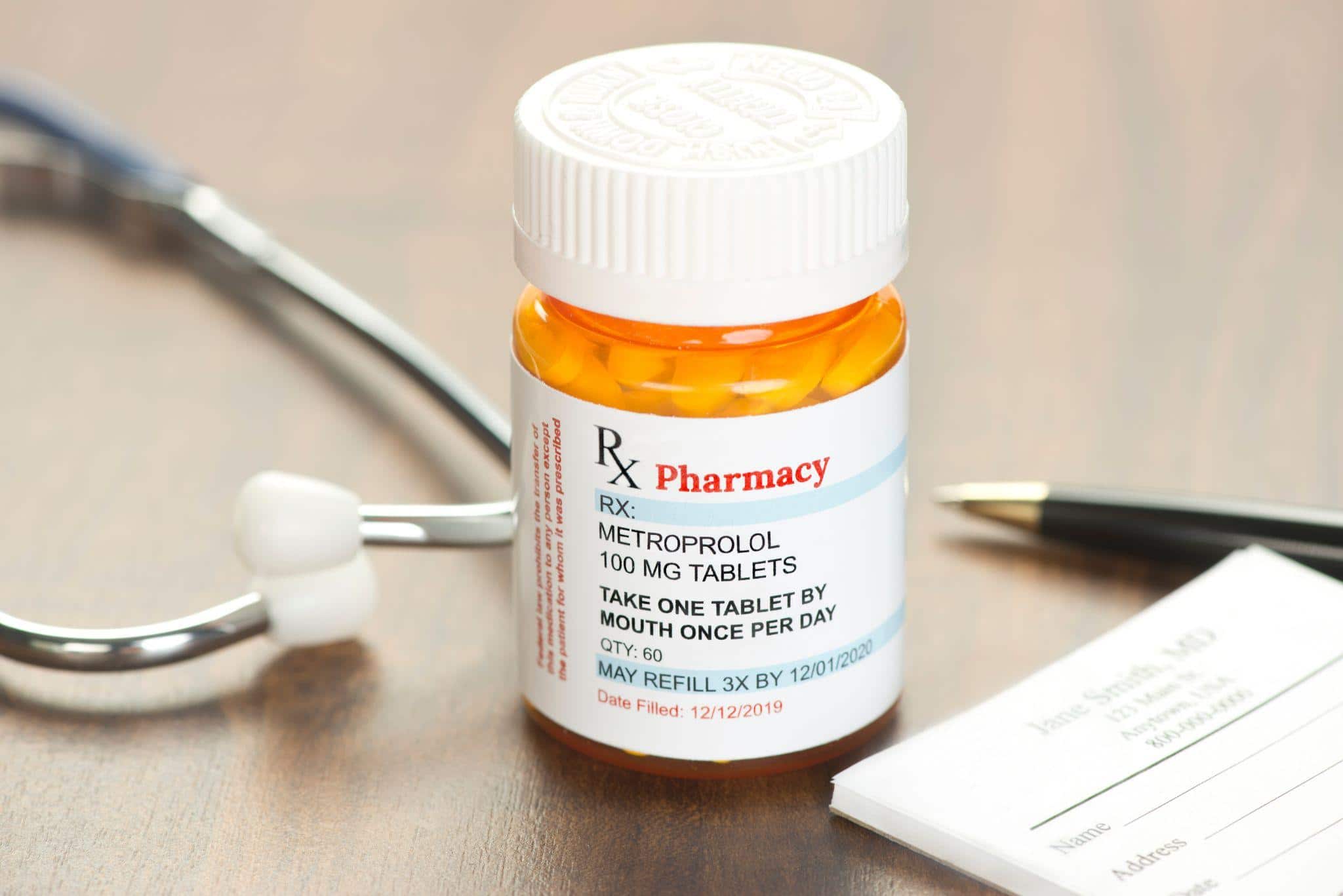Highlights
- Metoprolol (also known as Lopressor or Toprol-XL) helps to lower blood pressure, reduce chest pain, and improve circulation, all of which may prevent heart attacks.
- Metoprolol is generally safe for certain individuals, but others should avoid this medication.
If you have high blood pressure, angina, or heart trouble, your doctor may prescribe metoprolol. As with any medication, metoprolol should be taken according to your doctor’s directions. Here’s what patients should know about metoprolol, including answers to many common patient questions.
What Is Metoprolol and What Is It Used For?
Metoprolol is a prescription blood pressure medication that improves blood circulation and heart function. Doctors prescribe metoprolol for patients who experience:
- Chest pain (angina)
- High blood pressure (hypertension)
- Heart failure
- Irregular heartbeat due to atrial fibrillation or ventricular tachycardia
Metoprolol may also help prevent heart disease and second heart attacks. It is available as a generic or under the brand names Lopressor, Toprol-Xl, and the less-common Kapspargo Sprinkle.
How Does Metoprolol Work?
Metoprolol belongs to a class of drugs called beta blockers, which cause the heart to beat slower and with less force. Beta-blockers may also improve blood flow.

Beta-blockers work by blocking the effects of the hormone epinephrine, also known as adrenaline, which reduces the heart’s workload and helps it to beat more regularly. This can lower blood pressure.
What Formulas Are Available for Metoprolol?
Metoprolol is available in several forms, including:
- Metoprolol tartrate (immediate release). Available in tablet form, this formula is usually taken multiple times per day and is available in multiple dosage strengths (25 milligrams, 37.5 milligrams, 50 milligrams, 75 milligrams, or 100 milligrams).
- Metoprolol succinate (extended release). Available in tablet form, this formula is designed to release the medication slowly over an extended period and is typically taken once daily. The extended-release form is also available in multiple dose strengths (25 milligram, 50 milligram, 100 milligram, or 200 milligram).
- Metoprolol tartrate injection. This formula is used in hospital settings for the treatment of certain cardiac conditions, such as a heart attack or unstable angina.
Metoprolol Dosage and Administration
Dosages may depend on whether metoprolol is being used for initial treatment or maintenance of a medical condition. It also depends on the specific formula (immediate release or extended release).
Immediate-release formulas are usually taken more than once per day. Your doctor may prescribe a low dose in the beginning, then gradually increase your dosage based on how you respond to the medication. Follow your doctor’s instructions carefully.
How Should I Take Metoprolol?
Metoprolol can be taken with or without food. It’s advised to swallow the tablets whole with a glass of water; however, some formulas allow you to break the tablet in half to make it easier to swallow. Check your medication insert to see if your formula allows you to do this. Do not crush or chew the tablets.
Some doctors may recommend you take metoprolol at night, as it may cause dizziness. However, this can vary by individual, so check with your doctor to determine an ideal dosing schedule.
What Are the Potential Side Effects of Metoprolol?
Common side effects of metoprolol can include:
- Dizziness
- Drowsiness
- Nausea
- Diarrhea
- Constipation
- Heartburn
- Stomach pain
- Gas
- Bloating
- Itchiness
- Rash
- Runny nose
- Dry mouth
- Depression
Less-common side effects of metoprolol may include:
- Difficulty breathing or shortness of breath
- Swelling of the hands and feet
- Fainting
- Weight gain
- Rapid or irregular heart rate
Notify your doctor of any new, unusual, or concerning side effects.
What Should I Avoid When Taking Metoprolol?

Certain medications and substances may interact with metoprolol or impact its effectiveness. Some things you should avoid or use with caution when taking metoprolol include:
- Alcohol
- Other blood pressure-lowering medications
- Other beta blockers
- Nonsteroidal anti-inflammatory drugs (NSAIDs), such as ibuprofen
- Beta-2 antagonists
- Driving, until you know how this medication will affect you
Tell your doctor if any of the following apply to you:
- You’re currently taking any medications or supplements
- You’re pregnant or planning to conceive
- You have a slow or irregular heartbeat
- You have heart or liver disease
- You’re planning to have surgery (including dental surgery)
- You’re taking any other beta-blockers
What Should I Do If I Miss a Dose of Metoprolol?
If you miss a dose of metoprolol, skip the missed dose and resume your regular dosing schedule. It’s generally important not to double the dose to make up for the missed one, but the exact instructions for missed doses may vary depending on your specific prescription. Consult with your doctor for specific instructions.
What Should I Do If I Overdose on Metoprolol?
If you suspect you have overdosed on metoprolol, it’s crucial that you seek immediate medical attention. Call emergency services or go to your nearest emergency room.
Who Should Not Take Metoprolol?
Your doctor may not recommend metoprolol if you have certain medical conditions, including:
- Slow heart rate
- Sick sinus syndrome
- Severe heart block
- Cardiogenic shock
- Asthma
- Chronic obstructive pulmonary disease (COPD)
- Diabetes
- Hyperthyroidism
- Liver or kidney disease
- Pregnancy or breastfeeding
These conditions may require special monitoring or dosage adjustments when taking metoprolol.
Do not take metoprolol if you are allergic to it or have shown hypersensitivity to any of its components.
Are There any Potential Drug Interactions With Metoprolol?
Metoprolol has been shown to interact with several drugs, including but not limited to:
- Other medications that affect heart rate and blood pressure, including other beta blockers. Combining these medications can increase the risk of side effects, such as bradycardia and low blood pressure.
- Calcium channel blockers. Metoprolol can increase the risk of low blood pressure when taken with calcium channel blockers.
- Clonidine. Metoprolol can increase the effects of clonidine, which can lead to a sudden drop in blood pressure.
- Digoxin. Metoprolol can increase the levels of digoxin in the blood, which can lead to toxicity.
- MAO inhibitors. Metoprolol should not be taken with MAO inhibitors, as this can lead to a dangerous increase or decrease in blood pressure.
- St. John’s Wort. St. John’s wort can increase metoprolol in the blood, which can lead to side effects.
- Antidepressants. Some antidepressants, such as paroxetine and fluoxetine, can also increase the levels of metoprolol in the blood.
No interaction list is complete. If you notice any new or unusual symptoms after starting metoprolol, report them to your doctor.
Get the Lowest Price for Metoprolol With BidRx
BidRx makes it easy to find the best prices on metoprolol and other prescription medications. Create your bid today.
Please note that this information is intended for general informational purposes only. It is not a substitute for professional medical advice, diagnosis, or treatment. Always seek the advice of your physician or other qualified health provider with any questions you may have regarding a medical condition or medication.
